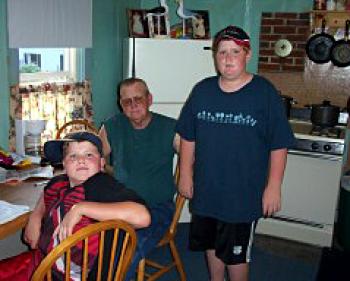Virgil Richards

Finding Friendship Oral History Project
The Finding Friendship Oral History Project is a joint effort of the Friendship Museum and the Friendship Village School, directed by Sally Merrick, museum volunteer, and Gaylea Hynd, teacher. In 2003-2004 sixth grade students conducted taped interviews of three generations of lobstermen and women, as well as others associated with the lobstering industry. Printed copies of the interviews and CDs of the printed transcripts are available at the Friendship Museum in Friendship, Maine.
Eleanor Barlow
Virgil Richards, born on May 22, 1936, in Waldoboro, is a fourth-generation resident of Friendship, where he has lived since 1940. He comes from a family with a deep lobstering tradition. With five siblings, three children, and three grandchildren, Virgil has spent 42 years as a lobsterman, making it his lifelong occupation. While lobstering is his primary focus, his special interest lies in his grandchildren.
Scope and Content Note
In this interview with Virgil Richards, conducted by Jimmy and Dillon on September 29, 2003, at Virgil's home, a wide range of topics related to his lobstering career were discussed. Virgil shares details about his entry into the lobstering industry in 1962 after his service in the Navy, following the footsteps of his lobsterman brothers. He describes his daily responsibilities on the boat, which involve managing and operating the entire operation, including owning the boat, setting traps, and fishing them. Virgil explains the significance of lobstering as a family tradition that extends back to his grandfather. He provides insights into his lobster boat, the "Still Smokin'," a 35-foot fiberglass vessel equipped with various navigational and safety equipment. The interview covers topics such as trap specifications, trap-setting techniques, bait preferences, and the impact of weather conditions on lobstering. Reflecting on his experiences, Virgil discusses the changes in lobstering since he began his career, such as the transition from wood to plastic equipment and the introduction of electronic devices. He expresses his deep connection to lobstering, describing it as something he was born into, and shared his bittersweet feelings about reaching the end of his career. Virgil also recounted some memorable moments from his lobstering expeditions, including catching unique and rare lobsters, such as a blue lobster that was sent to the aquarium in Boston. He discusses the challenges and occasional mishaps at sea but emphasizes that he had never encountered any significant incidents.
Please Note: The oral histories in this collection are protected by copyright and have been created for educational, research and personal use as described by the Fair Use Doctrine in the U.S. Copyright law. Please reach out Voices@noaa.gov to let us know how these interviews are being used in your research, project, exhibit, etc. The Voices staff can help provide other useful resources related to your inquiry.
The NOAA mission is to understand and predict changes in climate, weather, oceans, and coasts, to share that knowledge and information with others, and to conserve and manage coastal and marine ecosystems and resources. The Voices Oral History Archives offers public access to a wide range of accounts, including historical materials that are products of their particular times, and may contain offensive language or negative stereotypes.
Voices Oral History Archives does not verify the accuracy of materials submitted to us. The opinions expressed in the interviews are those of the interviewee only. The interviews here have been made available to the public only after the interviewer has confirmed that they have obtained consent.
